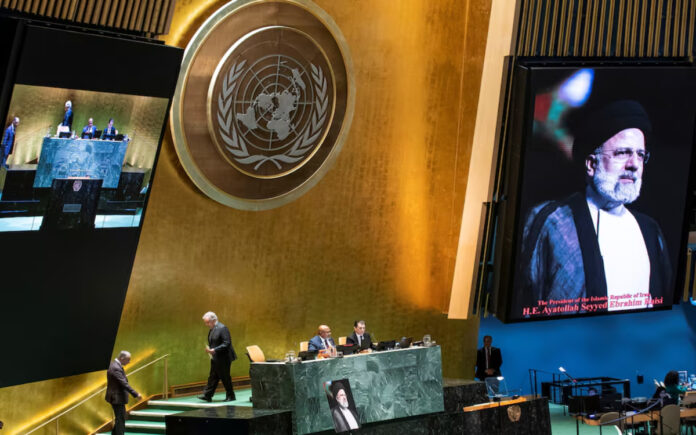New York: The United States made a poignant statement on Thursday by boycotting a United Nations tribute honoring Iranian President Ebrahim Raisi. Citing his alleged involvement in severe human rights abuses, the U.S. urged the UN to instead stand in solidarity with the people of Iran.
Raisi, a staunch hardliner viewed as a potential successor to Supreme Leader Ayatollah Ali Khamenei, tragically perished in a helicopter crash near the Azerbaijan border on May 19, amid adverse weather conditions.
Traditionally, the 193-member U.N. General Assembly convenes to pay respects to deceased world leaders who were incumbent heads of state. During the 50-minute tribute to Raisi, representatives from various countries and regional groups delivered speeches.
“The United States will not attend today’s United Nations tribute event for President Raisi in any capacity,” asserted Nate Evans, spokesperson for the U.S. mission to the United Nations.
“Raisi was involved in numerous, horrific human rights abuses, including the extrajudicial killings of thousands of political prisoners in 1988,” Evans stated. “Some of the worst human rights abuses on record took place during his tenure.”
Raisi’s past as a young prosecutor in Tehran, where he purportedly participated in a panel overseeing the execution of hundreds of political prisoners in 1988, has been extensively scrutinized by human rights organizations.
While Iran’s U.N. mission in New York refrained from commenting on the U.S. boycott, U.N. Secretary-General Antonio Guterres acknowledged Raisi’s leadership during a challenging period for Iran and the world at large.
Also Read | Elon Musk Agrees to Testify in SEC Probe on Twitter Stock Disclosures
“The United Nations stands in solidarity with the Iranian people and in the quest for peace, development, and fundamental freedoms,” affirmed Guterres.
Iran’s U.N. Ambassador Amir Saeid Iravani emphasized the profound influence of Raisi and Iran’s Foreign Minister Hossein Amirabdollahian, both lost in the same tragic helicopter accident.
“They were not just figures of authority, but also a symbol of hope, resilience, and the enduring power of good governance and diplomacy,” Iravani expressed to the General Assembly. “We remain committed to upholding the principles of peace, security, justice, and multilateralism that they tirelessly supported.”
With a presidential election slated for June 28 to determine Raisi’s successor, Iran stands at a crucial juncture in its political landscape.



